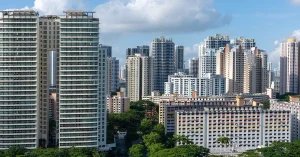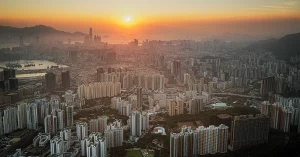The Union Cabinet, chaired by our Prime Minister, Mr. Narendra Modi, approved the long-awaited proposal of extending the Delhi Metro Rail Corporation’s yellow line of metro in Gurugram. Once completed, the preferred transit system in Delhi-NCR would facilitate connectivity from HUDA City Centre to Cyber City with a spur line to the Dwarka Expressway.
Table of Contents
With an estimated budget of ₹5,452 crore as per the Union Food and Public Distribution Minister, Mr. Piyush Goyal, the project has been proposed to be completed in four years from the date of the project’s sanction. According to the tender, the proposed 28.5 km elevated metro’s main line would span 26.5 km from Huda City Centre to DLF Cyberhub and will include stations to major commercial and residential areas of Gurugram, like Subhash Chowk, Hero Honda Chowk, Palam Vihar, etc. This will lead to increased accessibility to hotspot areas like Technology Park, Cyber Park, etc.
Further, the 1.85 km spur from Basai Village in Gurugram to Dwarka Expressway, will lead to connectivity to one of the most sought-after and emerging catchments of Delhi, with an easy commute to the prominent industrial belt emerging in the highway’s vicinity. While presently metro connectivity in Gurugram is limited to a 7 km stretch of the Delhi Metro line and the 11.6 km Rapid Metro, with no new expansion since 2017, the project’s approval is indeed a harbinger of relief for the residents and commuters of Gurugram. In this blog, we will delve into some of the benefits that this project is forecast to bring to the Millennium City.
Gurugram Metro Line: Ushering in an Era of Connectivity in Gurugram
Known for its majestic infrastructure, with towering buildings decorating the skyline, the city of Gurugram is the crown jewel of India’s IT and business revolution. Today, the city proudly calls itself home to expansive IT hubs like DLF Cybercity. Add to this mix the global ecosystem of the city, with its best-in-class facilities, FnB avenues galore, and industry-best commercial office space, and the reason why Gurugram has fast emerged as a melting pot with workers from all over the country is pretty evident.
However, with the population density in the city constantly on the rise, the city’s transit infrastructure framework has been under tremendous pressure. With the exception of Delhi Metro and Metropolitan City Bus Limited, which are infamous for their lack of last-mile connectivity to major commercial hubs, the global city has faced a severe deficit in the transit department. This has led to the city being a victim of bottleneck traffic and congestion, leading residents and commuters to time and again call for a robust transport system.
In light of this situation, the approval of the extension of the metro line in Gurugram is of great relief to the city’s denizens, who have long awaited an expansion of the metro network. The extended yellow line will alleviate congestion, reduce travel time, and offer a convenient mode of transportation. From a real estate investment perspective,, this new metro line will help enhance property values and attract more investors to the area. This is simply because connectivity is one of the most important drivers of real estate demand. With the metro line granting the city a paucity of accessibility to the major business hub in Gurugram as well as the emerging micromarket in the vicinity of the Dwarka Expressway, investors are more likely than ever to invest here.
Further, with the travel time between Delhi and Gurugram shortened via the spur line, both markets are anticipated to generate fresh prospects for growth and expansion. The result would be an inevitable increase in demand for residential and commercial properties in the region. This can lead to a rise in both rental and resale prices.
Another major advantage of the metro line extension would be the easy access it would provide to various employment centres in the region, particularly in the IT and technology industries. Employees today are actively searching for workspaces that are designed to improve their work-life balance. An important aspect that can greatly contribute to striking a healthy balance between these two aspects is a hassle-free and short commute. With the increased connectivity granted by the metro line, it will be easier than ever for professionals to commute to and from work, allowing them to save precious time. This will likely attract more top talent to the region and can lead to overall growth in both employment opportunities and salaries.
Employee productivity and retention are also more likely to increase with a shorter commute. This is evidenced by a study conducted in the UK highlighting that about 18.5% of employees consider defecting from their job due to a long commute, with the number rising up to 25% in cases of commute times over an hour.
Conclusion:
The extension of the Delhi Metro’s yellow line in Gurugram marks a significant step towards improving connectivity and mobility in the Millennium City. As the project takes shape over the next four years, Gurugram is poised to experience enhanced accessibility, economic growth, and a more efficient transportation system. This development underscores the commitment of the government to providing modern and sustainable infrastructure for the city’s residents and businesses.
With this metro extension, the global city is primed to transform into a connectivity haven, ideal for commercial investment. When it comes to investing in luxury office spaces in Gurugram, the name DLF Offices is synonymous with it. With its modern office ecosystem, a host of elite amenities, and strategic locations, whose access would be furthered with the advent of this metro project, you are sure to lease an office space that is bound to promise growth.








